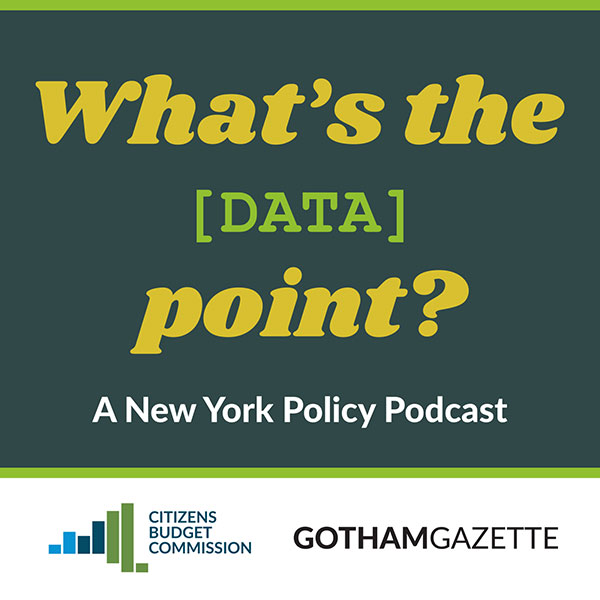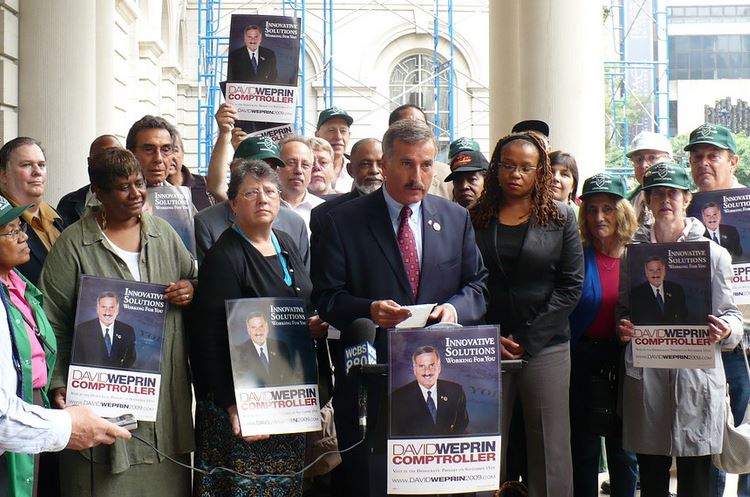What's the [Data] Point? 98,000, Addressing New York City School Overcrowding

What's The [Data] Point? Episode 77 -- 98,000, with CBC's Riley Edwards [You can download What's The [Data] Point? wherever you get your podcasts, including on iTunes]
 Citizens Budget Commission recently released a new report -- Cut Costs, Not Ribbons -- about how to address New York City's school overcrowding problems. The report, written by Riley Edwards, explains why the city has been misguided to use building new schools as the main tool toward reducing school overcrowding, which impacts almost half the city's 1.1 million students. Edwards joined the podcast to discuss her findings.
Citizens Budget Commission recently released a new report -- Cut Costs, Not Ribbons -- about how to address New York City's school overcrowding problems. The report, written by Riley Edwards, explains why the city has been misguided to use building new schools as the main tool toward reducing school overcrowding, which impacts almost half the city's 1.1 million students. Edwards joined the podcast to discuss her findings.
Listen to the conversation and let us know what you think: Ben Max of GG (@TweetBenMax), Maria Doulis of CBC (@MariaDoulis). Listen below or download wherever you get your podcasts!
***
by Ben Max, Gotham Gazette
@tweetBenMax @GothamGazette
Assemblymember David Weprin Plots City Comptroller Campaign

(photo: David Weprin for Comptroller, 2009)
State Assemblymember David Weprin of Queens has officially filed papers to run for New York City Comptroller in 2021 and has been raising funds for the race for the last five months. He is the third Democrat to jump into the race, joining New York City Council Members Helen Rosenthal of Manhattan and Brad Lander of Brooklyn.
The 2021 election is expected to be a herculean undertaking, with all three citywide elected officials, the five borough presidents, and all 51 City Council seats on the ballot. Except for the public advocate and about 15 City Council members, most elections will be for an “open” seat because of term limits preventing incumbents from running for reelection.
All-important in most New York City races, the Democratic primaries will be in June of 2021, just under two years from now.
Weprin has represented the Assembly’s 24th district since 2010, when he was elected in a special election. He holds the same seat that was once held by his brother, Mark Weprin, and before that his father, Saul Weprin, the former Speaker of the Assembly. Prior to serving on the Assembly, Weprin served two terms on the New York City Council, from 2002 till 2009, chairing the powerful Committee on Finance.
"I like to think that I’m the most qualified candidate for comptroller,” Weprin said in a brief phone interview, citing his prior experience as Deputy Superintendent of Banks under Governor Mario Cuomo, Secretary of the Banking Board for New York State, his long career on Wall Street, his time as chair of the Securities Industry Association, and as a member of the Assembly Ways and Means Committee.
This is not Weprin’s first attempt to win the office of the chief fiscal officer of New York City, who is charged with overseeing city spending, approving city contracts, and serving as fiduciary to the $200 billion-plus pension funds, among other duties. In 2009, Weprin unsuccessfully sought the Democratic primary nomination for comptroller, getting 10.6% of the vote. The election went to a runoff when no candidate crossed the 40% threshold for victory. John Liu of Queens, now a state Senator, eventually emerged as the winner of the runoff and the general election.
But Weprin expects different circumstances, chiefly, the fact that he may be the only candidate from Queens. "I thought I was the most qualified candidate in ‘09...but we had three Queens candidates and I think that hurt me significantly," he said, referring to himself, Liu and then City Council Member Melinda Katz. Weprin and Katz got far fewer votes than former City Council Member David Yassky, who advanced to the runoff.
That also wasn’t Weprin’s only unsuccessful bid at higher office. In 2011, he was the Queens Democratic Party’s pick after the resignation amid scandal of Anthony Weiner in the 9th Congressional District, which covers parts of Brooklyn and Queens, in yet another special election. But Weprin lost to Republican candidate Bob Turner by nearly 3,700 votes, giving the GOP that seat for the first time in 88 years.
Filings with the New York City Campaign Finance Board show that Weprin has raised $62,672 for his 2021 campaign from 154 donors. He has spent about $13,290 and has $49,382 in cash on hand as of the filing. Weprin has more than $444,000 in a state campaign account that he could transfer to his citywide account. But he also owes the CFB a debt of nearly $320,000 – a repayment of public funds from his 2009 campaign – which he must first clear before receiving any more public funds.
In terms of fundraising for this race, his two opponents already have a leg up. Lander has $204,468 in the bank, and Rosenthal has $66,777. All three candidates are participating in the CFB’s public matching funds program, under new rules that were approved last year and recently strengthened by the City Council. Each of them can raise maximum individual donations of $2,000, with the first $250 of each qualifying contribution being matched at an 8-to-1 ratio. Weprin already has $22,817 in matching claims, but those funds won’t be disbursed by the Campaign Finance Board until later in the election cycle. Neither Rosenthal nor Weprin appears to have made a large initial fundraising push, while Lander put some effort into fundraising, including a large 50th birthday party event. In conjunction Lander has also apparently made moves to lock in a number of early supporters among elected officials and activists whose names appeared on the party invitation, though his campaign has not rolled those out formally as of yet.
In the Assembly, Weprin serves as chair of the Committee of Correction, and has advocated for the passage of parole reforms through the Legislature (a major push for parole reforms failed in Albany this year). The Correction Officer’s Benevolent Association donated $2,000 to his comptroller campaign last month. He’s also received contributions from the Patrolmen’s Benevolent Association ($500) and the Uniformed Sanitationmen's Association ($1,000).
As of now, Weprin joins a field with two candidates occupying political space to his left.
"I know both of them, they’re both excellent City Council members," Weprin said of his opponents. "I have nothing negative to say about them. I just think my resume for comptroller is superior. That’s the only office I’m really interested in. I’m not just interested in running for the sake of running or running for mayor in the future. I have no intention of doing that. I think comptroller is an office I know something about. I think it’s an office I’m uniquely qualified for."
Notably, Weprin was among a vocal minority of state lawmakers who, in the run up to the state budget this year, opposed a proposal to create a congestion pricing program in New York City. The program eventually passed, though it will not be implemented till 2021, which could potentially make it an election issue in the city, particularly in Weprin’s native stronghold in eastern Queens.
***
by Samar Khurshid, senior reporter, Gotham Gazette
@samarkhurshid @GothamGazette
Note - this article has been updated with comment from Assemblymember David Weprin.
Note - this article has been updated to note that Weprin owes the CFB a $320,000 debt for repayment of public funds from his 2009 campaign.
New State Rent Regulations Complicate Inwood Rezoning Lawsuit Against the City

Inwood (photo: Emil Cohen/City Council)
New York state government’s recent rent regulation reforms gave tenant advocates reason to celebrate, eliminating major loopholes that allowed landlords to raise rents and deregulate units among the roughly 1 million city apartments currently governed by the rent laws. One unforeseen consequence of the new Housing Stability and Tenant Protection Act, however, is how the strengthened regulations may imperil a tenant lawsuit against New York City government on the impacts of a recent neighborhood rezoning of Inwood, in northern Manhattan.
Community groups and business owners from Inwood filed suit against the city in December, alleging the de Blasio administration failed to study crucial impacts of a rezoning -- which in this and some other cases means changes to land use rules to encourage more housing density -- on their neighborhood. One of their central arguments was the city neglected to analyze how preferential rents, or rents lower than the legal maximum landlords of rent-regulated apartments are allowed to charge, put the roughly 12,000 preferential rent leased tenants in Inwood and Washington Heights at the mercy of landlords. They allege landlords would be incentivized by a rezoning to push rent-regulated tenants out and capitalize on the likelihood of a hotter rental market.
New rent reforms passed in Albany in June significantly altered how preferential rents are governed and, in turn, dashed a major argument against the city. Amy McCamphill, a lawyer representing the City of New York, sent a letter to the judge in the lawsuit earlier this month pointing out the community members’ argument is no longer relevant.
“Following the passage of this 2019 legislation, Petitioners' preferential rent claim is simply moot,” wrote McCamphill, in the letter. “Under this new law, New York State has ensured that tenants receiving preferential rent are no more vulnerable to rent increases than any other tenant living in regulated housing.”
Among other things, the new rent reforms specifically designate that tenants in rent-stabilized units paying a preferential rent, or a “sweetheart deal” lower than what a landlord can actually charge, will have the preferential rate cemented as their actual rent at the next lease renewal. What it means for tenants is landlords cannot raise the rents sky-high when it is convenient for them, like when a housing market gets hot, as the tenants are renewing their lease.
Lawyers representing Inwood residents feel they lost a strong argument against the city but are glad Inwood residents received some extra protections from landlords via Albany.
“I’m really glad the rent laws passed. It’s a happy problem to have,” said Philip Simpson, an attorney who is a plaintiff in the case, which they are proceeding with.
“Landlords are still going to do what landlords are going to do to take apartments out of rent regulation. There needs to be better analysis from the city,” said Simpson.
Additionally, the petitioners argued the city did not properly study the rezoning’s impact on minority- and women-owned businesses, congestion, and racial displacement.
In response to the lawsuit, the city said in a typical rezoning it studies potential direct residential displacement, direct business displacement, indirect residential displacement, indirect business displacement, and specific industries, according to Hilary Semel, director of the mayor’s office that plans environmental reviews, in a supportive court filing for the city’s argument. Considering all those categories and after the lengthy environmental review, the city “properly determined that the Rezoning would not lead to any significant adverse impact,” wrote Semel.
The conflict over what the city should be studying also includes the type of tenants it is including in an environmental review. The city focuses “its displacement analysis on tenants living in non-regulated apartments,” according to McCamphill. She stated that the city mainly studied tenants living in non-regulated units because it was a legally satisfactory bar for the city to meet.
In a 2016 economic report of Washington Heights and Inwood conducted by State Comptroller Thomas DiNapoli, however, his office found that “nearly three-quarters of the 71,410 housing units in Washington Heights and Inwood were rent-stabilized.”
Lawyers for Inwood community members believe their case will still be strong without the preferential rent argument, especially when it comes to the city failing to study the racial impact of rezoning (the city currently has no requirement for a “racial impact study” as part of environmental review, but Public Advocate Jumaane Williams has introduced legislation to mandate it) and congestion. They argue the demolition of the Inwood library and the potentiality of rising property taxes and rents will have a detrimental effect on minority groups in the neighborhood.
Plus, they say traffic will bottleneck due to new development and more people moving in, which creates negative livability and public health impacts. The lawyers allege the rezoning “promotes no plan to significantly improve infrastructure or public transportation options in Inwood to alleviate the burden imposed by more residents and more cars.” With the nearest hospital at the top of Broadway near 220th Street, the lawyers question what the bottlenecking could mean for emergency situations when EMTs need to go up the one major thoroughfare of Inwood.
State Senator Robert Jackson, who represents the neighborhoods of Inwood and Washington Heights, came in with the new class of state Democrats who helped pass the rent regulations in Albany. He said he supports the rezoning lawsuit against the city.
“The landmark rent reforms we passed in Albany this session will help mitigate the damage done by that rezoning to rent-regulated tenants, especially those with preferential rents. But fixing one symptom doesn't mean you've cured the disease. The other symptoms that predatory rezonings cause—undue pressure on family-owned small businesses, strain on already-crumbling infrastructure, health risks posed by out-of-scale construction on contaminated and flood-prone land—these are not going to go away just because we've ushered in a wave of tenant power in Albany,” Jackson said in a statement.
The Inwood rezoning, spearheaded by the de Blasio administration in conjunction with City Council Member Ydanis Rodriguez and the city’s Economic Development Corporation (EDC), was the fifth neighborhood rezoning under the de Blasio administration to move through the detailed land use review (ULURP) process. All five, and a sixth since, have been in neighborhoods with large communities of color and lower-income populations.
The rezoning plan came with $500 million in city investments, including building new waterfront parks and investing $50 million in school infrastructure. The city said it is upzoning land along the Harlem river to facilitate commercial and residential development, and projects 2,600 new units of affordable housing across the neighborhood as a result of the overall rezoning. The plan also promises to preserve and protect another 2,500 existing affordable homes.
Though there are not any official plans yet, the EDC said also it is replacing the current Inwood library with a “state-of-the-art” library that includes a pre-K facility. In addition, the agency promises to fund STEM programming in school and will build a center celebrating immigrant achievements and performing arts.
Some Inwood residents strenuously protested these changes during ULURP, despite the positive community investments, because they argue community displacement through development outweighs certain benefits to parks and schools.
The arguments by the lawyers for both the city and Inwood residents in the lawsuit will be weighed by the Manhattan Civil Court judge in the case on August 13.
Overall, Jackson is both pleased with the rent reforms in Albany and pushing for the lawsuit. He said part of the work of the rent reforms was undoing the damage of the rezoning.
“That's why I still think the lawsuit is important, because it never was just about housing alone,” said Jackson. “It's about the ecosystem of a vibrant, working-class community of color being thrown out of balance to the detriment of many for the benefit of the few.”




